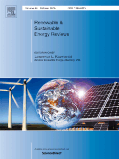 A renewable energy researcher who recycled material in several papers — and has already agreed to withdraw 10 studies — has lost another paper.
A renewable energy researcher who recycled material in several papers — and has already agreed to withdraw 10 studies — has lost another paper.
In January, we reported that six of 10 papers flagged by an investigation into author Shyi-Min Lu have either been retracted or withdrawn. Now, Lu has lost another paper that was not among the previous ten — again, for reproducing figures from earlier works without seeking permission from original authors. This paper was on a hot topic: gas hydrates, considered to be a potential new energy source to replace oil in the 21st century.
The investigations into Lu’s work took place at the Industrial Technology Research Institute in Hsinchu, Taiwan, where he was formerly based, and the National Taiwan University, in Taipei, Taiwan, which fired Lu from his position at the university’s energy research center.
Here’s the retraction notice in Renewable and Sustainable Energy Reviews, issued last month:
Multiple figures reproduced without permissions, and some also without reference either in caption/reference list.
This article has been retracted: please see Elsevier Policy on Article Withdrawal (http://www.elsevier.com/locate/withdrawalpolicy).
This article is retracted at the request of the Editor in Chief and with the agreement of the author.
This article reuses figures from earlier published papers/works which, although acknowledged in the in many cases and in the reference list in some cases, have been included without prior permission having been obtained from the copyright holder. A full summary of the figures and original sources is listed as follows:
Figures 1 and 2 earlier appeared in “Gas hydrates: entrance to a methane age or climate threat? ”, Environmental Research Letters, 4: 034007 (2009), doi:10.1088/1748-9326/4/3/034007, as Figures 1a and 2 respectively. The original source was not referenced although the Figure 2 caption states “Courtesy of Bundesanstalt für Geowissenschaften und Rohstoffe”.
Figures 4 and 5 earlier appeared in “Distribution and Characters of Gas Hydrate Offshore of Southwestern Taiwan” Terrestrial Atmospheric and Ocean Sciences, 17:4, pp. 615–644 (2006),http://tao.cgu.org.tw/pdf/v174p615.pdfas Figures 5 and 6 (lower) respectively. The original source was not referenced although Figure 4 caption references a different source [34] Chen SC, Wang YS. Gas hydratemining techniques. Sci Dev 2007; 412:26–31, and Figure 5 caption references a different source [37] Liu CS. Taiwan southwest waters emerging energy – gas hydrate resources survey and evaluation: seismic and geothermal survey (1/4). Central Geological Survey MOEA; 2008.
Figures 6 and 7 earlier appeared in an unpublished presentation by Tsanyao Frank Yang, Dept. of Geoscience, National Taiwan University, as Slides 12 and 14 respectively. THe original source was not referenced although the captions reference “Gas Hydrates Spindle Project, NSTPE, Phase II Planning Report”.
Figure 8 earlier appeared in The Real Weapons of Mass Destruction: Methane, Propaganda & the Architects of Genocide Part IV. An investigative report, (2011), http://theartofannihilation.com/the-real-weapons-of-mass-destruction-methane-propaganda-the-architects-of-genocide-part-iiiv/, as Figure 2 (excluding video). The original source was not referenced, but Figure 8 references https://www.gsj.jp/Muse/eng/tour/two/meth.html as the data source (although the figure does not appear in this source).
The journal apologizes to readers that this issue was not detected prior to publication.
The 2015 paper, “A global survey of gas hydrate development and reserves: Specifically in the marine field,” has been cited 11 times, according to Thomson Reuters Web of Science.
Earlier this year, The News Lens reported that the project Lu was working on — National Energy Program-Phase 1 — was funded by Taiwan’s Ministry of Science and Technology (MOST):
National Energy Program-Phase I was funded more than NT$20 billion (approximately US$595 million) over five years by MOST and the Ministry and Economic Affairs (MOEA).
Falin Chen, Lu’s co-author on some of his previous papers from National Taiwan University (but not the newly retracted paper), previously told us:
In August 2013 when I paid a three-month research stay in Durham University of UK, one of my students informed me that a paper entitled “Green Transport Infrastructure of Taiwan”…published by Mr. Shyi-Min Lu might plagiarize a MS thesis entitled “Energy Saving Analysis and Potential Schemes for Taiwan Inland Transportation” authored by Mr. Yu-Shun Huang, another student of mine…We immediately formed a team to conduct a comprehensive investigation on all publications of Mr. Lu, and found out that Mr. Lu privately submitted numerous manuscripts, including the two papers you noticed, without authorization of any other author named by Mr. Shyi-Min Lu.
We contacted Chen again after coming across the new retraction, but he told us that he has no more information from what he provided in January.
A spokesperson from the Industrial Technology Research Institute told us:
It seems to be [that] no records…trace back to this case since it has been a long while, and the person is not working for the ITRI any more as well.
It appears that four of the 10 previously flagged papers have not yet been retracted, so we’ve reached out to the relevant journals to find out if and when they will be issuing notices. We’ve so far counted five retractions (including the new one) and two withdrawals for Lu.
We’ve also messaged Lu — who is the sole author of the newly retracted review — and will update the post with anything else we learn.
Hat tip: Rolf Degen
Like Retraction Watch? Consider making a tax-deductible contribution to support our growth. You can also follow us on Twitter, like us on Facebook, add us to your RSS reader, sign up on our homepage for an email every time there’s a new post, or subscribe to our daily digest. Click here to review our Comments Policy. For a sneak peek at what we’re working on, click here.
In the first line, “renewable researcher” is presumably missing the word “energy” in the middle. (Not that some of us researchers wouldn’t mind being a bit more renewable.)
Fixed, thanks.